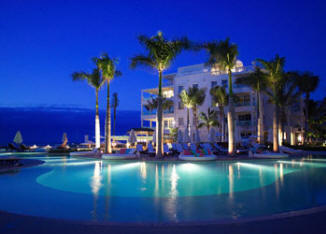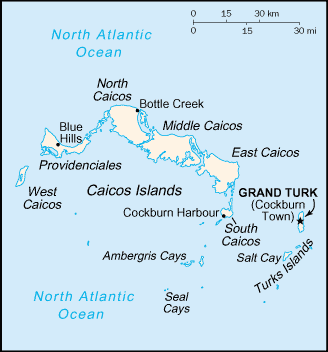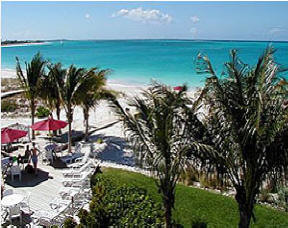|
The Turks and Caicos Islands is an
overseas territory of the United Kingdom
consisting of two groups of tropical islands in
the Caribbean, southeast of the Bahamas, at
21°45′N 71°35′W. The territory is geographically
part of the Bahamas islands, but not
politically. The thirty islands total 166 sq.
mi. (430 km²), primarily of low, flat limestone
with extensive marshes and mangrove swamps. The
weather is usually sunny and relatively dry, but
suffers frequent hurricanes. The islands have
limited natural fresh water resources; private
cisterns collect rainwater for drinking. The
primary natural resources are spiny lobster and
conch. The United Nations Committee on
Decolonization includes the Turks and Caicos
Islands on the United Nations list of
Non-Self-Governing Territories.
Politics
See also Politics of the Turks and Caicos
Islands
The capital of the Turks and Caicos Islands is
Cockburn Town on Grand Turk. The islands were
under Jamaican jurisdiction until 1962, when
they assumed the status of a crown colony. The
governor of the Bahamas oversaw affairs from
1965 to 1973. With Bahamian independence, the
islands received a separate governor in 1973.
Although independence was agreed upon for 1982,
the policy was reversed and the islands are
presently a British overseas territory. The
islands adopted a constitution on August 30,
1976, which is Constitution Day, the national
holiday. The constitution was suspended in 1986,
but restored and revised March 5, 1988. The
territory's legal system is based on English
common law, with a small number of laws adopted
from Jamaica and the Bahamas. Suffrage is
universal for those over 18 years of age.
English is the official language.
As a British territory, Queen Elizabeth II of
the United Kingdom is the sovereign, represented
by a governor. The head of government is the
chief minister. The Executive Council consists
of three ex officio members and five appointed
by the governor from among the members of the
Legislative Council. No elections are held; the
monarch is hereditary, the governor appointed by
the monarch, and the chief minister appointed by
the governor.
The unicameral Legislative Council consists of
19 seats, 13 popularly elected; members serve
four-year terms. Elections were held March 4,
1999, and again in 2003. The Progressive
National Party, led by Hon. Dr. Michael Misick
holds eight seats, and the People's Democratic
Movement, led by Derek H. Taylor, holds five
seats. The United Democratic Party, led by
Wendal Swann, received a small fraction of the
popular vote, but not enough to earn a seat.
The judicial branch of government is headed by a
Supreme Court.
Turks and Caicos participates in the Caribbean
Development Bank, is an associate in Caricom,
and maintains an International Criminal Police
Organization - Interpol sub-bureau. Defence is
the responsibility of the United Kingdom. In
December of 2004 the Turks and Caicos Islands
sought to become a new associate member to the
Association of Caribbean States (ACS) article.
History of the Turks and Caicos Islands
From Wikipedia, the free encyclopedia.
The first inhabitants of the Turks and Caicos
Islands were Amerindians, first the Arawak
people, who were, over the centuries, gradually
replaced by the warlike Carib.
The first European to sight the islands was
Spanish conquistador Juan Ponce de León, who did
so in 1512, though some historians claim that
Guanahani, the native name of the island
Christopher Columbus called San Salvador on his
1492 voyage, is Grand Turk Island or East Caicos
Island.
Spanish slavers frequently raided the islands,
enslaving the Caribs of the islands. Only a year
after first being discovered, the entire
archipelago was completely depopulated.
During the 16th, 17th and 18th centuries, the
islands passed from Spanish, to French, to
British control, but none of the three powers
ever established any settlements.
From about 1690 to 1720, pirates hid in the cays
of the Turks and Caicos Islands, attacking
Spanish treasure galleons en route to Spain from
Cuba, Hispaniola, and the Spanish possessions in
Central America and Peru.
The islands were not fully colonised until 1681,
when salt collectors from Bermuda built the
first permanent settlement on Grand Turk Island
(thought to be so named due to the presence of
cacti with, what appeared to them to be red
fez-like structures on their tops, but this not
likely to be true, since the fez was unknown to
Turkey before 1826). The salt collectors were
drawn by the shallow waters around the islands
that made salt mining a much easier process than
in Bermuda. Their colonization established the
British dominance of the archipelago that has
lasted into the present day. Huge numbers of
trees were felled to discourage rainfall that
would dilute the salt mining operation. Most of
the salt mined in the Turks and Caicos Islands
was sent to Newfoundland to be used for
preserving cod.
The agricultural industry sprung up in the
islands in the late 1780s after 40 Loyalists
arrived after the end of the American
Revolution, primarily from Georgia and South
Carolina. Granted large tracts of land by the
British government to make up for what they lost
in the American colonies, the Loyalists imported
well over a thousand slaves and planted vast
fields of cotton.
Though in the short term highly successful, the
cotton industry quickly went into decline, with
hurricanes and pests destroying many crops.
Though a few of the former cotton magnates
changed to salt mining, just about every one of
the original Loyalists had left the islands by
1820, leaving their slaves to live a subsistence
lifestyle through fishing and hunter-gathering.
In 1799 the islands were given representation in
the Bahamas Assembly, and they remained part of
that colony until 1848, when the inhabitants
successfully petitioned to be made a separate
colony under the supervision of the governor of
Jamaica. This arrangement proved to be a
financial burden, and in 1873 the Turks and
Caicos Islands were annexed to Jamaica with a
Commissioner and a Legislative Board.
The islands remained a dependency of Jamaica
until 1959, when they received their own
governor. When Jamaica was granted independence
from Britain in August 1962, the Turks and
Caicos Islands became a crown colony.
The salt industry, along with small sponge and
hemp exports, sustained the Turks and Caicos
Islands (only barely, however; there was little
population growth and the economy stagnated)
until in the 1960s American investors arrived on
the islands and funded the construction of an
airstrip on Provo Island and built the
archipelago's first hotel, "The Third Turtle". A
small trickle of tourists began to arrive,
supplementing the salt economy. Club Med set up
a resort at Grace Bay soon after. In the 1980s,
Club Med funded an upgrading of the airstrip to
allow for larger aircraft, and since then,
tourism has been gradually on the increase. It
is common for foreign couples to be married in
the Turks and Caicos Islands today.
In 1980, the ruling pro-independence party, the
People's Democratic Movement, agreed with the
British government that independence would be
granted if the PDM was reelected in the
elections of that year. The PDM lost the
elections to the Progressive National Party,
which supported continued British rule. The
PNP's leader, Norman Saunders, became chief
minister, and won the 1984 elections. However,
in 1985 Saunders and two associates were
convicted in the USA on drug charges.
The PNP emerged victorious from the following
by-elections, but on July 24, 1986, the governor
dissolved the government and replaced it with an
advisory council after a report on allegations
of arson and fraud found that the chief minister
post-Saunders, Nathaniel Francis, along with
four other PNP officials were unfit to rule.
Under the careful guidance of the governor and
the advisory council, a new constitution for the
Turks and Caicos Islands was created and
elections held in 1988, with the PDM winning by
a landslide, and Washington Misick becoming the
new chief minister.
Wenika Ewing was the islands' representative to
the Miss Universe contest in 2005. |








